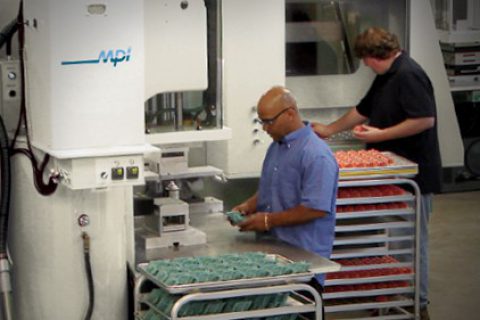Hinchey Tours Poughkeepsie Manufacturing Plant, Highlights Actions To Create Local Jobs By Boosting Hudson Valley Exports
Hinchey Tours Poughkeepsie Manufacturing Plant, Highlights Actions To Create Local Jobs By Boosting Hudson Valley Exports
Maurice Hinchey News – 22nd Congressional District – August 26, 2010 – Jeff Lieberson

“For our economy to see a full recovery, we’ve got to create the high-skill, high-wage jobs of the future and that is exactly what is going on here at MPI,” said Hinchey. “This is a company that has persevered despite a tough economy and today they export their product to countries around the world and create jobs here in the Hudson Valley. It is critically important that we continue supporting companies and small businesses like MPI, and that’s why I’m working to improve our national manufacturing strategy, reduce our trade deficit and end currency manipulation by China.”
When President Obama took office, the future of the American manufacturing sector looked bleak after having lost 4.6 million in recent years. To turn things around, Hinchey strongly supported and worked to pass several bills.
The U.S. Manufacturing Enhancement Act, H.R. 4380, was signed into law earlier this year to help U.S. manufacturers compete at home and abroad through over 600 tariff suspensions. The bill lowered the cost of doing business and increased the competitiveness of U.S products, helping to support tens of thousands of American jobs.
The American Jobs and Closing Tax Loopholes Act would eliminate $11.6 billion in tax loopholes for U.S. companies with foreign branches. Currently, companies with foreign branches are able to manipulate a loophole in the tax code that allows them to shift most of their manufacturing operations offshore in order to pay little or no taxes to the U.S. This legislation would close this loophole and force these companies to once again pay their fair share of U.S. taxes and incentives them to manufacture their goods in the U.S.
The National Manufacturing Strategy Act, H.R. 4692, requires a comprehensive analysis of the nation’s manufacturing sector every four years and directs the president to submit to Congress a National Manufacturing Strategy, which identifies goals and recommendations for how the federal government, working with state, local and private institutions, can best support the growth of U.S. manufacturers.
The End the Trade Deficit Act, H.R. 1875, establishes an “Emergency Trade Deficit Commission” to examine the nature, causes and consequences of the U.S. trade deficit and make recommendations on reducing trade imbalances.
The Clean Energy Technology Manufacturing and Export Assistance Act, H.R. 5156, helps American businesses to export clean energy technology products and services by implementing a National Clean Energy Technology Export Strategy and by providing information needed to navigate foreign markets.
“We are already seeing a growing clean energy industry throughout New York, and we will see even more jobs created if we capitalize on the huge export potential for manufacturers of solar panels and other green energy technologies,” said Hinchey. “The U.S. Department of Energy has estimated that with the right strategy in place, which we’ve started to implement in Congress, the United States could increase clean energy exports by as much as $40 billion per year, and that could create more than 750,000 jobs over the next ten years.”
In 2007, Hinchey worked to establish The Solar Energy Consortium (TSEC), a 501(c)3 nonprofit, to drive the creation of a solar energy cluster in New York by connecting local universities and companies to help overcome technological, strategic and economic challenges. Hinchey recently attended TSEC’s second annual job fair where over a dozen area solar manufacturers were looking to hire for more than 140 positions. In July, he visited Tech City in Ulster, NY where Solartech Renewables is producing the first high-volume, commercial solar panels made by a U.S.-owned company in the eastern United States. In March, Solartech Renewables announced its move to Tech City as a result of incentives provided by TSEC with Hinchey’s support.
Hinchey, who has opposed unfair trade deals like the North Atlantic Free Trade Agreement (NAFTA) and the Central American Free Trade Agreement (CAFTA) because they cause the exportation of U.S. jobs out of the country, is a cosponsor of the Trade Reform, Accountability, Development and Employment Act (TRADE Act), which would require a comprehensive review of major trade agreements on the books, ensure that environmental labor and human rights standards are addressed in future agreements, and give Congress the authority it needs to assert its proper constitutional role in the trade negotiating process by significantly limiting future fast-track authority.
“One of the most important things we’ve got to do in order to establish a fair playing field for U.S. manufacturers is to revisit some of the unfair trade deals, which do not include basic labor and environmental standards,” said Hinchey. “We must also ensure that other countries, like China, aren’t manipulating the value of their currency in order to boost their own manufacturing industry at the expense of our own.”
Hinchey is working to end ongoing currency manipulation by China. He recently signed a letter to the House leadership expressing concern about ongoing Chinese currency manipulation and requested that H.R. 2378, the Currency Reform for Fair Trade Act, be brought to the floor for a vote. This legislation would allow for the imposition of countervailing or anti-dumping duties on injurious imports from any country that persistently undervalues its currency.

